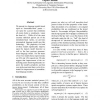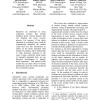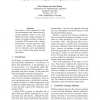ACL
2001
14 years 27 days ago
2001
We present two language models based upon an "immediate-head" parser -our name for a parser that conditions all events below a constituent c upon the head of c. While al...
ACL
2001
14 years 27 days ago
2001
This paper addresses the issue of designing embodied conversational agents that exhibit appropriate posture shifts during dialogues with human users. Previous research has noted t...
ACL
2003
14 years 27 days ago
2003
Link detection has been regarded as a core technology for the Topic Detection and Tracking tasks of new event detection. In this paper we formulate story link detection and new ev...
ACL
2001
14 years 27 days ago
2001
The RAGS proposals for generic specification of NLG systems includes a detailed account of data representation, but only an outline view of processing aspects. In this paper we in...
ACL
2003
14 years 27 days ago
2003
We introduce a probabilistic noisychannel model for question answering and we show how it can be exploited in the context of an end-to-end QA system. Our noisy-channel system outp...
ACL
2001
14 years 27 days ago
2001
Educators are interested in essay evaluation systems that include feedback about writing features that can facilitate the essay revision process. For instance, if the thesis state...
ACL
2003
14 years 27 days ago
2003
We present a probabilistic parsing model for German trained on the Negra treebank. We observe that existing lexicalized parsing models using head-head dependencies, while successf...
ACL
2003
14 years 27 days ago
2003
We present a novel approach for finding discontinuities that outperforms previously published results on this task. Rather than using a deeper grammar formalism, our system combi...
ACL
2001
14 years 27 days ago
2001
We address the issue of on-line detection of communication problems in spoken dialogue systems. The usefulness is investigated of the sequence of system question types and the wor...
ACL
2003
14 years 27 days ago
2003
We present a language-independent and unsupervised algorithm for the segmentation of words into morphs. The algorithm is based on a new generative probabilistic model, which makes...



